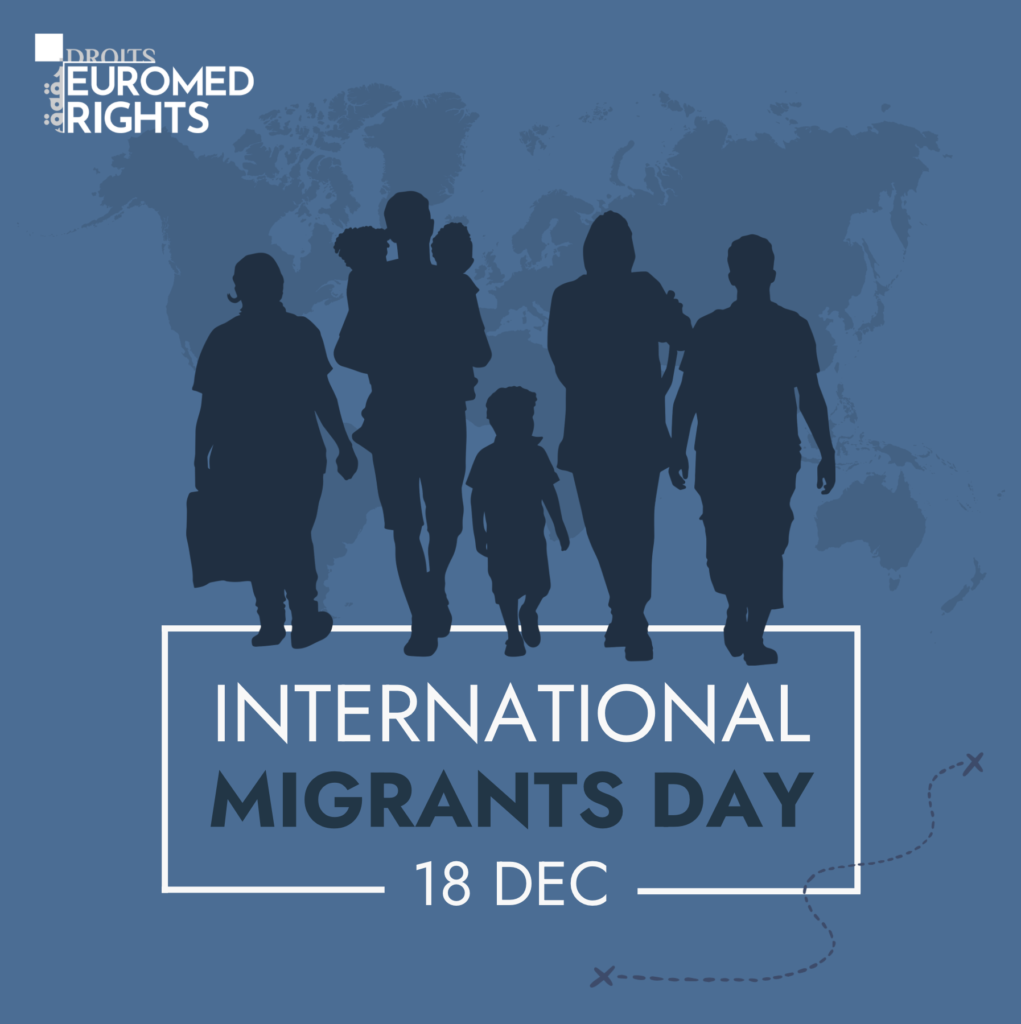On the occasion of International Migrants Day, the signatory organizations oppose security policies that undermine the fundamental rights of people on the move in the Mediterranean region. While this day, adopted by the United Nations General Assembly on 4 December 2000, commemorates the adoption of the International Convention on the Protection of the Rights of All Migrant Workers and Members of Their Families, no member of the European Union has yet ratified this convention.
On the contrary, in recent years, EU Member States, with a view to externalizing and militarizing their borders, have been adopting increasingly restrictive and xenophobic policies, which violate the human rights of people on the move, such as the right to mobility and the fundamental right to life.
The year 2024 was marked by electoral campaigns based on the denigration of migrants and refugees on both shores of the Mediterranean. In a context of economic and institutional crisis, part of the ruling classes explicitly designated migrant populations as scapegoats. Popular or institutional racism has spread in many countries of the Euro-Mediterranean region.
On an international scale, the hegemony of reactionary ideas that contributed to the lockdown of Fortress Europe has been reaffirmed by the European elections. The Pact on Migration and Asylum reinforces initiatives that were still unacceptable a few years ago, by systematizing detention and preventing access to the right to asylum.
In neighboring countries, the last two years have been marked by a proliferation of externalization agreements that finance the repression of migratory movements by third countries, which have become the EU’s border guards. Dubravka Šuica, the new Commissioner for the Mediterranean, is in charge of drawing up a new Pact for the Mediterranean which contains “comprehensive partnership agreements with third countries” in line with the externalization agreements already signed. In contrast to the establishment of safe and regular pathways for migration, in recent weeks, “innovative solutions”, such as the agreement between Italy and Albania, have been brought to the forefront of the EU policy scene. Some Member States have called for the revision of the Return Directive as a matter of priority, which they hope to receive as early as February 2025. The signatory organizations oppose these measures.
Similar trends are observed among the EU’s Mediterranean partners. Tunisia and Egypt, following the latest presidential elections, brought to power two leaders who reinforce the repression of people on the move. In North Africa, migrants experience a continuum of violence ranging from verbal abuse to torture. In Libya, cases of slavery, torture and murder have been documented. Activists who work in solidarity with migrants are criminalized, prosecuted, or even imprisoned.
The signatory organizations refuse to accept the fate of missing migrants which could be prevented. The number of disappearances continues to increase due to the constant and often deliberate non-involvement of States in the search for missing persons in the Mediterranean basin. Their families relentlessly search for their loved ones, sometimes for decades, making mourning impossible and reunion increasingly unlikely.
In the face of this state of affairs, we will continue to defend the freedoms of people who refuse to give up their right to study, work or live outside their country of birth. We will not stop advocating for the respect of the right to asylum: being a refugee is not a crime, and international protection is a fundamental human right. EuroMed Rights and the signatory organizations convey its message of solidarity with the families of the disappeared and with migrants confronted to exploitation and oppression, whether racist, xenophobic and/or sexist. No to differential treatment of lives: dignity, truth and justice for all.
- Action pour l’égalité, le soutien et contre le racisme (KISA)
- Anti Racism Movement (ARM)
- Association Marocaine des Droits de l’Homme (AMDH)
- Association Tunisienne des Femmes Démocrates (ATFD)
- Associazione Ricreativa Culturale Italiana (ARCI)
- Center for Legal Aid Voice (CLA)
- Center for Peace Studies (CPS)
- Centre national de coopération au développement (CNCD-11.11.11)
- Centre per la Defensa dels Drets Humans (Irídia)
- EuroMed Rights (EMR)
- Fondation pour la Promotion des Droits en Algérie
- Greek Council for Refugees (GCR)
- İnsan Hakları Derneği (İHD)
- Institut Novact de Noviolència (Novact)
- La Comisión Española de Ayuda al Refugiado (CEAR)
- Ligue des Droits de l’Homme (LDH)
- Organisation Marocaine des Droits Humains (OMDH)
- Tamkeen for Legal Aid and Human Rights

